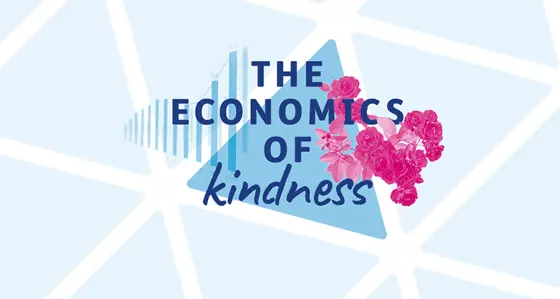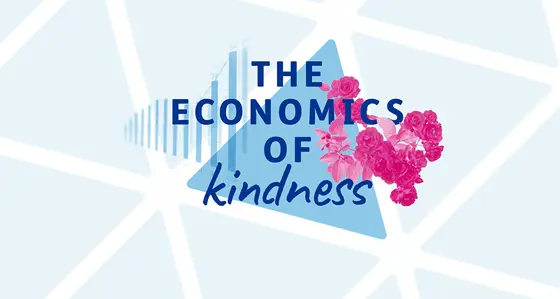
Can kindness and value creation go hand in hand?
8 min read 17 May 2024
Kindness is crucial to value creation. In fact, our research shows that 47% of companies considered kind doubled their earnings in the decade to 2022. Just 35% of unkind companies did the same.1 But how can organisations be deliberate about delivering tangible value creation but with kindness?
Traditional approaches to value creation often need to be short-term, financial and shareholder-focused, and this can be at the expense of employees, customers and society - all points that lean potentially towards being unkind. That’s not new news for those driving value creation agendas. But increasingly, successful companies create value by taking a more holistic, enterprise-wide view and considering a broader set of stakeholders.
Ilya Selivanov, SVP of Productivity and Transformation at consumer goods company Reckitt describes this approach to value creation as "an agenda that fully connects to the growth of the company and fully connects to what we do with our suppliers and what we do with the resources of the planet".2
This approach isn’t just more responsible and considerate, but the practical thing to do, too. With credit becoming more expensive and harder to come by – and the risk that we’re following a similar course to the credit crunch of 2008-20093 – now is the time to reshape your value creation strategy, making sure kindness is at its core. Being kind is different from being nice. Kindness involves tackling the tough and uncomfortable strategic decisions head-on to maximise value, something that niceness may avoid.
Rob Maguire, Partner at Baringa and a Value Creation expert, is familiar with the value creation opportunity facing business leaders. “All too often, external reports get written specifying a particular level of value, yet what materialises falls short – largely because the recommendations aren’t realistic and the company doesn’t have the support to execute what needs to be done,” he says. “At Baringa, we help companies narrow the gap between the ‘say’ and the ‘do’ – the expected value and the reality of what gets delivered.”
So, what can companies do differently to maximise value creation?
Maximising value creation isn’t simply a methodology. Ideas for true value come from people who are both book and street-smart – those with the curiosity to solve the toughest of challenges. Finding the right advisers to work with – deep industry experts with practical experience – is an essential first step.
Read on for our top three considerations and thoughts on using kindness to get more from your value creation strategy:
1. Knowing when to make the tough calls
Kindness isn’t about just being nice or taking the easy path. It involves making the hard decisions – and successful enterprise value creation relies on making fair, data-backed, and sustainable decisions with conviction.
The stark reality is that, in realising their businesses’ true value, the majority of boards and executives will face many uncomfortable choices – choices that may be counter-cultural, impact short-term performance, affect their people, or harm their brand and reputation. They must be comprehensive and evaluate all options and implications. Leave no stone unturned. An independent adviser who shares the same level of curiosity will tell you what you need to hear – even when that advice may not be the most comfortable.
Companies might be committed to the triple bottom line4 – concentrating as much on social and environmental issues as they do on profits – but financial pressures and demands will often make it tempting to let some areas, such as sustainability goals, take a back seat. A good adviser will have experienced these pressures and demands before, and will be honest about the consequences.
Ultimately, smart decisions for the long term are needed – not easy ones that follow the path of least resistance and provide a short-term fix.
Making the tough calls with our clientsWe work with a range of clients who need to realise value in their organisations. And it involves some really hard decisions. Whether on location strategy, energy security, divestment or market exit (to name a few), there are some tough calls to make – all of which have a significant impact on value creation. Is there a kind approach to these decisions? It’s a challenge, but the answer is ‘yes’. We work with clients to look to the long term. And we use our deep sector expertise to understand potential impacts on the bigger picture – whether that’s goals, customers, people, culture, or anything in between. |
2. Building an effective team by putting people first
It’s the kind, human thing to do – and the sensible approach to achieve long-term value. That means partnering with people, not delivering to them.
Putting people first is about creating buy-in, generating momentum and building the skills in an organisation to drive value creation organically. The last thing a reluctant team needs are actions forced upon them. Leaders and managers who are invested in and trained to think more commercially, will own and drive change - relying less on external support and creating a more resilient and self-sustaining culture. And there’s now clear evidence that investors look at culture as a measure of whether a company is worth buying into.5
Putting people first also means balancing the opportunities to create value against the impact of decisions on all stakeholders. This should come naturally to an adviser with a deep working knowledge of your sector. And, if letting people go is deemed necessary, how this process is managed will say a lot about the leadership and culture of the business – and the goodwill you create will help galvanise6 your people in the future.
Companies need an adviser they can collaborate and share expertise with. It’s best to develop recommendations together. Employing a consultant to present a report in isolation isn’t going to deliver the desired value.
Putting people first in a global media and comms businessOne of our clients is a global media and advertising organisation operating in every continent. They had grown by acquisition, but integration had been a challenge – growth opportunities had been missed and margin eroded. Change was needed. The easy solution would have been a top-down cost optimisation or classic margin improvement programme. Instead, we worked with them to put people first – a bottom-up, organic, truly enterprise-wide approach where account leads were trained and equipped to develop margin improvement ideas, and where leaders were targeted to deliver improvements and revenue growth. |
3. Being realistic with your shareholders
Despite market headwinds, shareholder expectations never change. Value creation is at the heart of meeting those expectations. But these journeys aren’t linear, and the potential results aren’t always instant. So, expectations need to be managed – shareholders respect honesty and recognise that strategic ambitions may require short-term pain for long-term gain.
Companies need an experienced hand - to stand shoulder-to-shoulder with them in the boardroom and present the reality of the opportunities available. This demands an ability to navigate and balance many moving parts. What’s right to do? What's the short-term versus the long-term picture? Do we know the scale of change involved? It also relies on knowing where the organisation is on its value creation journey, and what can be achieved by when.
A good adviser will have the right data to help benchmark and inform progress. A great one will use that data and draw on practical experience to manage the trade-offs and tension between different stakeholders, guiding the boardroom and shareholders forward. Ensuring everyone knows the reality of the opportunity will help align all individuals and create greater commitment to the end game.
Working side by side with a major telco client to manage stakeholdersOne of our telecommunications clients had ambitious financial targets. We helped them develop a long-term, enterprise-wide approach. We worked side by side with the executive team to hold regular progress reviews with the board of directors to keep sight of this direction – what we were doing, why, what we were achieving, and the realistic forecasts for the company’s performance. Our close working relationship and our honest and clear view enabled us to help them steer the strategic direction and introduce new initiatives to meet their targets. |
A new beginning for value creation
Today, companies need ways to create and maintain value that endures. But they need to consider all options and stakeholders - all while managing the inherent tensions of taking this broad view. They need recommendations that are grounded in practical reality – ones they are able to implement and sustain with lessening support or, ideally, on their own. They need objective partners to guide, counsel and say it as it is throughout the entire value creation journey, from recommendation to implementation. This comes from the who and the how. The skill and the style. Curiosity and kindness.
At Baringa, we’re driven by a belief that business realities come from experience over textbooks, and that kindness in business pays. We’re sector experts who know our clients’ companies and communities inside-out. We have the deep technical and operational expertise needed to find value creation opportunities, and the know-how to help clients think holistically and for the long-term. And, because we’ve done it before, we provide the recommendations and support needed to narrow the gaps between what can be expected and what gets delivered.
Get in touch with Ben, Rob or Laura to find out more about how we could work with you on your value creation journey.
Meet our experts
 |
Ben leads Baringa’s Enterprise Value Creation capability, which focuses on helping leaders sustainably transform organisational performance from a strategic, financial and operational perspective. He enjoys helping leaders to translate business strategy into operational reality, and is at his best in complex transformation environments where he can design and deliver new operating models, capabilities and processes that improve business performance.
|
 |
Rob has led and supported some of the world’s largest value creation programmes, working with shareholders and executive teams to identify billions of dollars in EBITDA opportunities across their end-to-end value chains. He is a deep expert in Operations and Back Office cost and productivity improvements and has particularly expertise in energy, utilities and the public sector. |
 |
Laura has spent her consulting career advising C-suite clients on growing revenues, increasing market share, and improving profitable sales. Laura runs the Growth Strategy team, supporting clients in defining go-to-market models and seamlessly executing commercial strategies by articulating their value proposition with effective pricing approaches, resulting in accelerated growth plans and improving EBITDA. |
References
1 Anya Davis, Baringa, 5 September 2023, Firms considered “kind” are more likely to be successful
2 Ilya Selivanov and Becks Grainger, Baringa, 1 June 2023, How a broader definition of enterprise value can unlock energy and innovation in your organisation
3 George Glover, Business Insider, 20 January2024, Bank credit is shrinking for the first time since the Great Recession - and that's a red flag for the economy
4 Matt Papachristou, Baringa, 30 May 2023, People – planet – profit, in that order
5 Ian Moore, Partner at CBPE Capital, Baringa, 3 October 2023, Investing in kindness
6 Anya Davis and Annie Hazlerigg, Baringa, 23 July 2023, The bank of goodwill
Related Insights
Trending content in this series

Introducing the Economics of Kindness
At Baringa we’re convinced that, no matter the macroeconomic backdrop, kindness in business really does pay. That’s why we’re taking this opportunity to explore the economics of kindness across four pillars: people, business, leadership and investors.
Read more
People – planet – profit, in that order
The notion of a ‘triple’ bottom line – people first, then planet, then profit – is reshaping how organisations around the world do business. They’re bringing corporate kindness to the fore as we enter a new type of economy, and the businesses that organise themselves in this way will be the ones that succeed.
Read more
Redefining kindness in the workplace
Corporate kindness is all about the impact an organisation has on the world, engaging in responsible practices that benefit their customers, employees, and the communities they operate in.
Read more
Bringing kindness back to the top of the leadership agenda
Should kindness be back at the top of the leadership agenda? Managing Partner Adrian Bettridge discusses how when we lead with kindness, we generate lasting success for ourselves, our clients and our businesses.
Read more
It’s not easy to be a kind leader
Can leaders be kind all of the time? What gets in the way? Ian Peters reflects on the challenges and trade-offs of trying to be kind to all stakeholders.
Read more
Our Economics of Kindness journey: the story so far
What have we learned about kindness in business and in our public organisations? Does it pay? And if so, how?
Read moreIs digital and AI delivering what your business needs?
Digital and AI can solve your toughest challenges and elevate your business performance. But success isn’t always straightforward. Where can you unlock opportunity? And what does it take to set the foundation for lasting success?